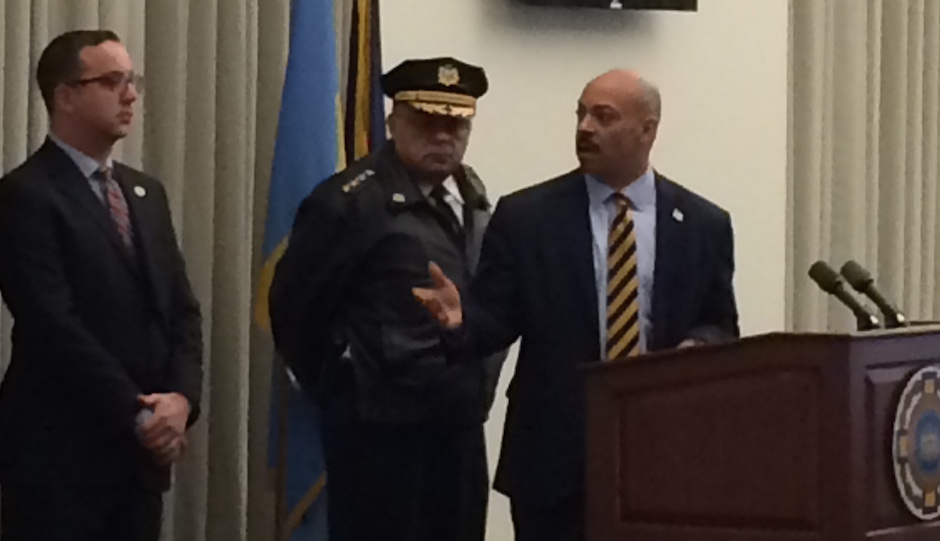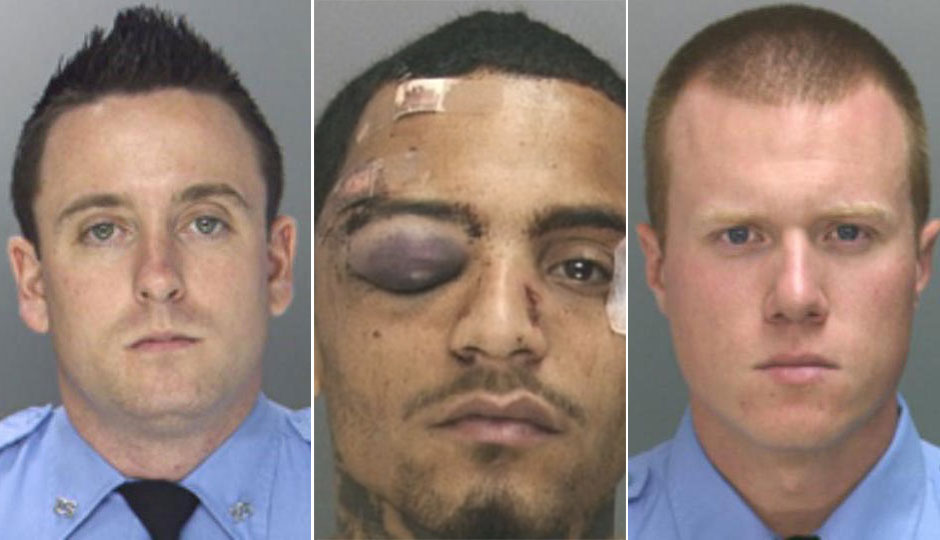Police Brutality Charges Show the System Is Trying, Not That It’s Working

Commissioner Charles Ramsey, middle, looks on as D.A. Seth Williams announces charges against two Philadelphia Police officers.
Seth Williams was almost right.
The district attorney entered last Thursday’s press conference — the one announcing brutality charges against two Philadelphia police officers — seemingly intent on one thing: Proving that this city is no Ferguson, that abusive officers will be held accountable, and that no additional layers of accountability are needed here.
“Hopefully,” he said, “this case will show Philadelphians that our system here works.”
Again, almost.
In the interest of fairness, let’s discuss what did, indeed, go right in the case: Once confronted with video evidence supporting allegations that two officers needlessly, brutally beat Najee Rivera in a traffic stop, police and prosecutors didn’t try to sweep the matter under the rug. They took the matter to a grand jury where — despite all the lurid tales we’ve heard in recent months of police-friendly prosecutors putting their thumbs on the scale against police accountability — a recommendation for charges emerged.
That’s great: Give the system proper inputs, and you stand a better chance of getting proper outcomes.
Here’s the problem: Left to its own devices, the system likely wouldn’t have received the proper inputs. The system almost certainly would’ve put Najee Rivera behind bars for “resisting arrest” — or, best-case scenario, free on probation but with a huge black mark on his record — while the officers who beat him would still be on the streets right now.

Officers Sean McKnight (left) and Kevin Robinson (right); Najee Rivera (center)
More to do
It wasn’t police or prosecutors who uncovered the video evidence that turned the case around, remember. It was Rivera’s girlfriend, who canvassed the neighborhood where the beating took place and eventually found a “barber shop-auto detailing business” whose outdoor security camera provided the the incontrovertible proof of what had actually happened.
The system — thank goodness for Najee Rivera — got lucky. Or, more precisely, it got the proper inputs because somebody outside the system went the extra mile to ensure it got those inputs. That is not at all the same thing as “working.”
Thursday’s press conference didn’t do much to instill confidence in the system. Commissioner Charles Ramsey said his department might alter protocols to seek out video evidence in any case where severe injuries result.
But he also sounded slightly put out about that effort.
“Remember now, we have tens of thousands of arrests that take place every single year in the city,” he admonished reporters. “We have to come up with something that makes sense.”
A suggestion: If an encounter between police and civilians puts anybody in the hospital, that’s when you seek out the video evidence. That doesn’t require canvassing all the neighborhood stores after every minor citation gets written — just when it really matters.
Then again: If the entire police force starts wearing body cameras, some of these questions might become moot.
That doesn’t solve every problem. Williams made the case that an independent police watchdog agency isn’t needed to root out police corruption — but he and Ramsey also urged people with evidence of police misconduct to contact Internal Affairs or the D.A.’s office. As much as the latest charges should earn Williams some credit, he seems to be downplaying the fact that a victim of abuse might be scared to take their complaint (or proof) to police or the prosecutors who usually work with them. An independent agency is needed because the appearance of a conflict of interest is often as bad as the actual conflict.
A day after Williams and Ramsey’s press conference, a former police officer received a sentence of one day in prison for a charge stemming from his “undocumented arrest” of an Iraqi War veteran. It was an ugly abuse of power, but the judge said the officer had had a “stellar” career and went easy on him. So much for equal treatment under the law.
I really believe that Philadelphia officials are trying to make the department more accountable when transgressions happen. Last week’s events do prove that. But they also show how much more needs to be done. It’s not yet time to be satisfied.
Follow @JoelMMathis on Twitter.


